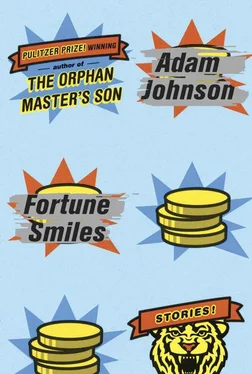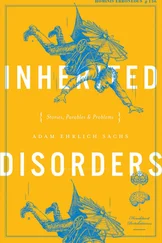The surprising thing was that DJ had a pretty good hunch who was playing it. When he and Sun-ho finally made it to South Korea, they’d spent a couple months in a government transition facility called Hanawon. There he met a woman who was famous for defecting with her accordion. People said it had nearly drowned her while she was crossing the rushing autumn waters of the Tumen River. Her name was Mina, and she hadn’t wanted to defect, she said, but her husband had disappeared, and she’d gone looking for him.
DJ started walking toward the melancholy sounds. The chords were triumphant and lonesome, a mix he hadn’t heard since leaving home. Yet halfway to the Samil-daero exit, he realized the music was getting fainter, that he was heading the wrong way. The song stopped; he’d lost her. But the melody, the haunting way Mina had played it, stuck in his head. Aboveground, he wandered the neighborhoods, suddenly nostalgic for the North. The barren, snow-dusted mountains surrounding Seoul reminded him of the icy bluffs ringing Chongjin. The crooked tile roofs and bent aerial antennas of Bukchon Hanok Village felt familiar. Passing a church, he heard a huge congregation inside praising Yesu-Nim before falling quiet in prayer. Though he couldn’t see the worshippers, DJ paused on the sidewalk, and here came a sound that was pure North Korea: the nearly silent shush of a thousand heads bowing in unison.
Soon his attention returned to Seoul’s bewildering nature. Here were women in plastic surgery masks and little dogs wearing dresses. Passing a fitness center, DJ stared at rows of men running on treadmills. What force was driving them? What were they running from? Next came a cat café and a parlor where teenage girls danced with machines. At an empty shopping plaza, he watched an escalator endlessly cycle, the steps appearing, rising and disappearing as it carried no one up to nowhere.
In this state of mind, DJ arrived at Lotteria. Inside, he took a seat in a yellow booth. Through the glass, he observed the startling street life: a young woman with tattoos on her neck, a college boy wearing eyeliner, a fully grown and able-bodied man of military age sitting on the curb, doing nothing. The only normal thing DJ could see was Sun-ho, making his way slowly down the street. He had a bad hip and a sleepy leg that he dragged around. In the North, he was only as big as a thirteen-year-old. Here, he was the size of a child, though the intensity of his large, wide-set eyes kept anyone from mistaking him for one.
When Sun-ho entered, he offered DJ a subtle nod, and though he was no longer under DJ’s command, he went right away to get their food, cutting to the front of the ordering line. Once there, he turned to examine the patrons he’d just skipped over. They looked down to their phones, pretending nothing had happened. Sun-ho studied them a moment, then shook his head. He had no patience for South Koreans, with their all-powerful sense of order and compliance. It was one thing to surrender to the rule of a murderous dictator, but what unseen forces did these Southerners obey?
“Ready to receive your order,” a Lotteria worker said.
Sun-ho located his cigarettes and placed one in his mouth.
“Smoking is not permitted,” the worker said. “Corporate policy.”
Sun-ho pointed at the sign depicting all the food. He pointed at the bulgogi burger set, then held up two fingers.
“Would you like those burgers Shanghai-spicy?” the worker asked Sun-ho.
Sun-ho nodded and produced some government-issued meal coupons.
The worker shook his head. “We don’t honor those,” he said.
Sun-ho patted his pockets until he located his matches. “Do you believe in the divine spark?” he asked the worker.
Here was where Sun-ho’s gruff Northern accent registered on the worker. The people in line also paused — the man in the golf sweater, a group of teens in school uniform.
“I don’t understand,” the worker said.
Sun-ho stared into the man’s eyes. “Do you believe in the all-consuming flame of the Lord?” he asked. “Do you believe that only fire can burn away your sin?”
It was true that Sun-ho was not a large man, but make no mistake: he had served seven years of naval duty aboard a ten-man submarine; he’d run afoul of the Bowibu and made it through a winter in Camp 25. The man had walked the Arduous March in North Hamgyong Province through the worst of the famine. Sun-ho had survived the Purge of Chongjin.
The restaurant worker accepted the coupons and served the food in takeaway bags.
Sun-ho joined DJ in the booth, where he removed his dental plates and began unwrapping his burger.
“Where did you get that crazy talk?” DJ asked him. “You had me nervous.”
“This is a discovery I made,” Sun-ho said. “Christian talk, when said in a non-Christian way, scares these Southerners to death.”
“You’ve been going to too many meetings.”
“Far too many meetings,” Sun-ho said, and took a bite.
When they first arrived at Incheon airport and surrendered to authorities, they didn’t go free, as they’d expected. Instead, they spent eight weeks in Hanawon, where they were debriefed, interviewed, fingerprinted and subjected to a battery of physical and mental exams. All defectors ended up there. They took group classes about adjusting to life in South Korea — handling money, hygiene, being pleasant, avoiding crime. DJ and Sun-ho had lived pretty good lives in the North, so they weren’t as stunned as other defectors. Still, one thing they learned in Hanawon surprised them: in the South, Dongjoo and Sun-ho weren’t the most popular names for boys. Old-fashioned names might hinder their assimilation, they were told. The officials suggested Dongjoo adopt a hip nickname like DJ. Sun-ho left the room.
Even when they got out of Hanawon, they weren’t free. Too many defectors had become alcoholic, homeless, suicidal or, worse, had redefected. So there were meetings — case officer meetings, support group meetings, Christian outreach meetings, weekly “Talk Out” sessions. On Saturday mornings, middle school children gave them English lessons. They were given bank accounts, housing allowances and a stack of food vouchers that no decent restaurant would accept. Luckily, this was the food they loved the most. So much flavor, so hot, and like magic, it appeared whenever you wanted it.
Together, they nodded in pleasure, savoring every bite.
“What do you think?” Sun-ho asked. “Would Willow have liked this burger?”
DJ was silent.
Sun-ho answered his own question. “Yes, I think she would have enjoyed this burger very much.” With a french fry, he scraped Shanghai sauce drippings off the paper wrapper. “These fries, though,” he continued, “they’re too greasy for her. You remember Willow’s skin, how perfect it was. So yes to the burger, but because of her complexion, she would avoid the fries.”
Rumor had it that Sun-ho had slept with every widow in Chongjin. Yet all he talked about was Willow, how he’d nearly attained Willow, that with a little more time, Willow would have become his. And since their escape, Willow had somehow risen to the level of angel, as pure and inaccessible as Yesu-Nim Himself.
DJ knew better than to get Sun-ho going on Willow, but he couldn’t help it. He asked, “What would Willow think of all the Namhan women you’re sleeping with?”
“Preparing to sleep with,” Sun-ho corrected. “You don’t just jump on a Southern woman, my friend. You cultivate her. You must attend many meetings. And for the record, what I do with other women has no impact on Willow’s purity.”
DJ asked, “Are you telling these Southern women the juicy stories they crave?”
“The point of the meetings is to process your experience,” Sun-ho said. “These women are volunteers; they care about our plight. The whole reason they’re there is to listen.”
Читать дальше












